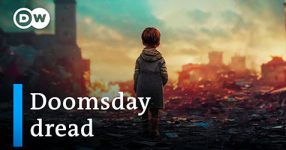The documentary “OK, Doomer! – Apocalypse Maybe: E3” explores the contemporary perception of time in the digital age compared to the analog era. The narrator reflects on the shift from traditional clocks to digital timekeeping, emphasizing the lack of a clear narrative arc in the current digital media environment.
In the analog era, clocks provided a sense of the passage of time, each minute marked by the slow movement of a second hand. However, in the digital age, the narrator suggests a disconnect, with digital clocks lacking the narrative element, contributing to the disorientation and desperation for a coherent story in today’s society.
Doom Scrolling: The Perils of Digital Addiction
The documentary delves into the phenomenon of “Doom scrolling,” a term used to describe the act of endlessly scrolling through digital content, often leading to a loss of time, productivity, and a distorted sense of reality. Individuals share their experiences of being entrapped in the cycle, losing awareness of their surroundings and succumbing to the addictive nature of information consumption.
Interviewees discuss the challenges of breaking free from Doom scrolling, recounting moments of realizing hours have passed and feeling a sense of disconnection from their physical surroundings. The addictive nature of social media platforms, designed to capture attention and engagement, exacerbates the problem, leading to a pervasive unhealthy relationship with technology and information.
The Impact of Information Overload and Global Crises
The documentary further explores the consequences of information overload, particularly during the initial year of the pandemic. People turned to online activities, including excessive shopping and Doom scrolling, as a way to exert control amid the uncertainty. The rise of global crises, such as climate change, wars, and economic instability, contributes to a heightened sense of doom and anxiety.
The narration touches upon the influence of social platforms, manipulating attention for profit, and the overwhelming nature of information on various crises. The loss of agency and the feeling of chaos among the general public are highlighted, shedding light on the challenges of navigating an increasingly complex and interconnected world.
Technology, Labor, and Monetization of Human Behavior
The documentary explores the evolution of the internet from a tool for unleashing creativity to a mechanism for predicting and monetizing human behavior. The shift from a peer-to-peer culture to a profit-driven model is discussed, emphasizing the notion that users, as the product and labor force, contribute to the success of social media companies.
The exhaustion experienced after using the internet is reframed as labor, challenging the conventional idea of online activities as merely recreational. The discussion extends to the ways in which technology companies leverage data to sell back forms of empowerment to users, perpetuating a cycle of information consumption.
Billionaire Preppers and the Quest for Safety
The documentary takes a turn towards the perspectives of the elite, particularly billionaire preppers who seek refuge in remote locations like New Zealand. The filmmaker explores the motivations behind the wealthy’s belief in an impending apocalypse, shedding light on the measures taken to insulate themselves, including building underground bunkers.
Interviews with individuals in Queenstown, New Zealand, discuss the changing landscape due to the influx of billionaires, the socioeconomic impact, and the perception of New Zealand as a safe haven. The film prompts reflection on how the powerful’s belief in an impending end influences their decisions and actions.
Community and Prepping: A Pessimistic Outlook with Solutions
The collapse subreddit becomes a focal point, with discussions centered around the concept of collapse—a radical reduction in population or complexity across multiple systems. The documentary features conversations with collapse subreddit moderators, revealing a community that provides a space for discussing solutions rather than dwelling solely on pessimism.
Contrary to the stereotype of preppers as isolationists, the film highlights the importance of community and shared resources in the prepping community. The loss of hope is acknowledged, but the documentary emphasizes that it doesn’t necessitate apathy, sparking a call to action and activism even in the face of uncertainty.
Transitioning Forward in Interesting Times
As “OK, Doomer! – Apocalypse Maybe: E3” concludes, it circles back to the narrator’s reflection on living in interesting times. The collapse awareness, once perceived as a romanticized notion, is framed as a reality. The film leaves viewers with a contemplative message, urging them to acquire understanding and skills for the transitionary phase, suggesting that despite the loss of hope, it’s a great time for growth and resilience. The audience is left to grapple with the complex intersection of digital media, global crises, and individual actions in the contemporary landscape.












